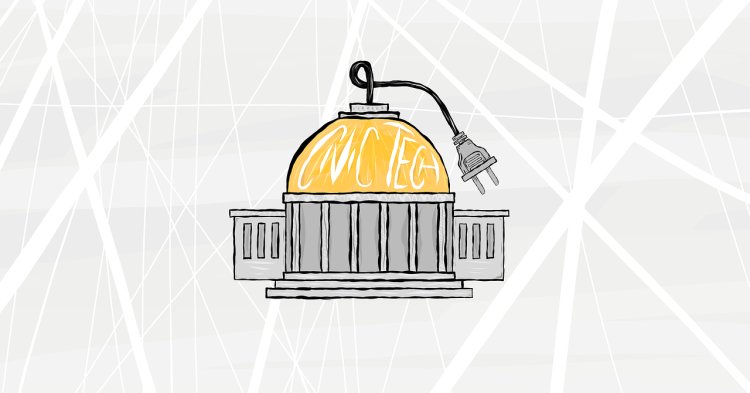Widening gaps between political elites and their citizens has caused concern in many democratic states. A more deliberative form of democracy, aided by technological advances, could help alleviate this. Digital democracy could change the way citizens interact with their government by bridging the gap between institutions and people and bringing decisions closer to the people they affect. This would reconfigure the relationship between the individual and the state, and ignite a move towards increased political participation.
Sudden change towards online parliaments and online voting all over the world due to the Covid-19 pandemic could kick-start a transition towards the digitalisation of democracy. Day-to-day government activities have already been moving online, with Denmark, UK, and German parliaments shifting to hybrid online-offline approaches, and the Welsh Assembly moving entirely online [1]. With the online world becoming more accepted in modern daily life, the move towards digital democracy looks more probable.
Local governance uses
In Spain, the 15M demonstrations in 2011 shook the political status quo, so after municipal elections that year, Decide Madrid was created [2]. This is a citizen participation platform, launched in 2015, which allows Madrid residents to propose local laws and debate with others. These debates are sometimes used to help Councillors gauge public opinion on certain topics and, in some cases, Councillors interact with the debates themselves [2]. Swathes of ideas are collected and filtered by a randomly selected citizen assembly, who decide which ones to propose for policy-making. The platform underpinning Decide Madrid has also been used further afield by municipal governments in Barcelona, A Coruña, and others [2].
In 2014, the Mayor of Paris began a participatory budgeting initiative where Parisians could propose ideas for where and how the city budget should be allocated [2]. Initiatives are shared online and support is provided to assist people in promoting their idea [2]. Locals can then vote online or in-person for their preferred projects, and can even track the progress of the successful projects [2].
National governance uses
After the 2008 financial crash, the Icelandic government experienced a huge decrease in trust, suffering an increasing disconnect between the political authorities and the citizens [4]. In response to this, ‘Your Priorities’ was created. This is a crowdsourcing tool used to generate ideas and facilitate constructive dialogue. Crowdsourcing, in this context, is the process where ideas and suggestions are obtained from a large group of people openly and voluntarily. Your Priorities has been used by a whole host of organisations in over 25 countries by over 2 million people [4]. For example, it was used by the Estonian national government to crowd-source ideas for amending Estonia’s electoral and political party laws [4].
Digital democracy is also being used outside of Europe. After the 2014 protests in Taiwan, members of the protest group “g0v” were given positions in government and began to improve government transparency and increase citizen participation in the decision-making process. In light of this, vTaiwan was created (standing for Virtual Taiwan) [3]. The platform links stakeholders and citizens together to share opinions and make recommendations [3]. These recommendations are handed over to the parliament to be accepted or rejected [3].
Why is it useful?
Digital democracy may be a way to improve the quality and legitimacy of political decision-making. The current political system in most modern states works on the basis that citizen’s involvement in political decision-making is limited because of the large population sizes. However, mass collection-gathering of ideas nowadays is not just a possibility but, in many places, a reality. Methods of digital democracy could be used to build greater trust in public institutions and bring people closer to the source of democratic decision-making.
Is it all it’s cut out to be?
There are certainly drawbacks to the use of digital participation. Mass crowdsourcing of ideas may overwhelm governments, limiting their capacity to consider ideas fairly and thoughtfully. If so, this could lead to even greater alienation of citizens from political institutions than is currently experienced. To prevent this, the expectations of the process would have to be clearly laid out and adhered to by the institutions implementing them. Further, increased digitalisation of democratic processes may diminish the relative strength of certain citizen’s political voices. For example, older citizens and those without easy access to the internet may be limited in their ability to partake. There must also be efforts to prevent a global monopoly of one digital deliberative forum. It would be a dangerous suggestion to have one company setting the agenda for many national decision-making processes.
The future of digital democracy
A trend in these examples seems to be that many initiatives are implemented after a shake-up of the political system. Covid-19 has certainly changed the way day-to-day politics is conducted, possibly leading to an increase in the levels of digitalisation of politics coming out of the pandemic. While there are undoubtedly issues with digital democracy, many of them have realistic solutions. If digital democracy continues to become more common, it could breathe fresh life into many democratic processes.
References
[1] Beacon, Rosie. ‘How Covid-19 Is Accelerating the Rise of Digital Democracy’. Institute for Global Change, 22 May 2020. https://institute.global/policy/how-covid-19-accelerating-rise-digital-democracy.
[2] Boelman, Victoria, Julie Simon, Theo Bass, and Geoff Mulgan. ‘Digital Democracy: The Tools Transforming Political Engagement’. Nesta, 20 February 2017. https://www.nesta.org.uk/report/digital-democracy-the-tools-transforming-political-engagement/.
[3] Miller, Carl. ‘How Taiwan’s “Civic Hackers” Helped Find a New Way to Run the Country’. the Guardian, 27 September 2020. http://www.theguardian.com/world/2020/sep/27/taiwan-civic-hackers-polis-consensus-social-media-platform.
[4] Citizens Foundation. ‘Your Priorities’. https://www.citizens.is/getting-started/.


Follow the comments: |
|
